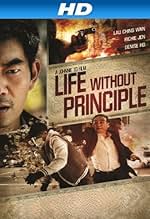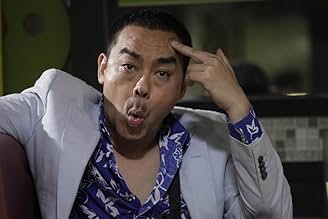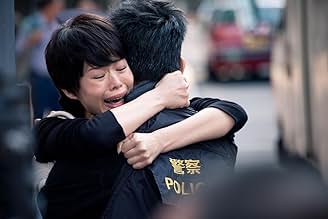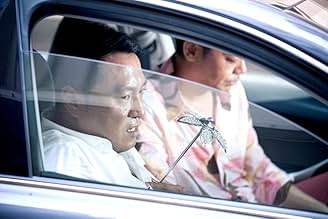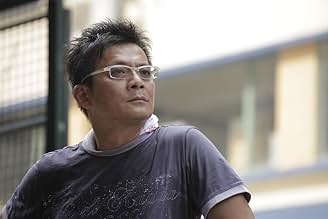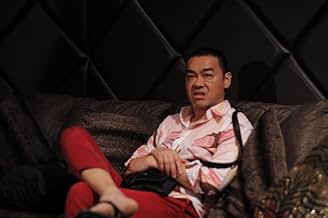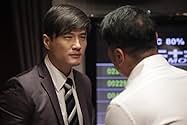IMDb-BEWERTUNG
6,9/10
2891
IHRE BEWERTUNG
Füge eine Handlung in deiner Sprache hinzuThree people - a criminal, a bank officer and a cop - end up in a catastrophic situation in the midst of a global economical crisis and are forced to betray any morals and principles to solv... Alles lesenThree people - a criminal, a bank officer and a cop - end up in a catastrophic situation in the midst of a global economical crisis and are forced to betray any morals and principles to solve their financial problems.Three people - a criminal, a bank officer and a cop - end up in a catastrophic situation in the midst of a global economical crisis and are forced to betray any morals and principles to solve their financial problems.
- Auszeichnungen
- 17 Gewinne & 28 Nominierungen insgesamt
Ching-Wan Lau
- Panther
- (as Ching Wan Lau)
Richie Jen
- Inspector Cheung
- (as Richie Ren)
Eddie Cheung
- Wah
- (as Siu-Fai Cheung)
Siu-Kay Lee
- Brother Four
- (as Siu-Kei Lee)
Empfohlene Bewertungen
10lyx-1
I really don't understand the low ratings for this superb film. This is one of the most brilliant films about the current state of the world as reflected in Hong Kong society I've seen, especially as an indictment against the financial markets and banks, as exemplified in the cold reptilian nature of the female banker. The non-plot is seamlessly woven, though there's a tribute to Kieslowski here, and To coaxed great performances from most of his cast. The interwoven lives are gripping in their own roller-coaster way, as fortunes ride up and down not unlike the stock market. The only disappointment for me was the ending - I did not expect that of To, but again, it could have been the nod to Kieslowski that he wrapped it up the way he did.
"Life Without Principle" ("Dyut Meng Gam") was nothing at all what I had expected it to be. Was it better than I had anticipated? No, hardly so.
As much as I enjoy Hong Kong cinema, then this movie failed to utterly embrace and capture my liking. Why? Well, I guess it was because the movie tried to tell different tales that were spinning around the same axis - an axis that was a bag with 5 million Hong Kong dollars - but ultimately failed to wrap all stories up in a satisfying way.
Ching Wan Lau (playing Panther) really carried the movie most of the time and did a good job with his portrayal of a rather twitchy and edgy guy in the Hong Kong gangster milieu. But also Denise Ho (playing Teresa) put on a memorable performance in the movie. Richie Ren (playing inspector Cheung) was also doing a good job. Terence Yin (playing Mr. Sung) could have use a lot more screen-time, because his role was too small and had potential to bring something greater to the movie had he been given the chance.
There were aspects of the movie that were great, but in overall the movie didn't fully deliver. And of course, it is not all Hong Kong movies that bring the goods to the table, and for me, then "Life Without Principle" failed to do so miserably on some levels.
I doubt that I will ever put this movie on again for a second watching, as it just doesn't have that much leverage or that much to offer. Director Johnnie To has far better movies to his directing career.
As much as I enjoy Hong Kong cinema, then this movie failed to utterly embrace and capture my liking. Why? Well, I guess it was because the movie tried to tell different tales that were spinning around the same axis - an axis that was a bag with 5 million Hong Kong dollars - but ultimately failed to wrap all stories up in a satisfying way.
Ching Wan Lau (playing Panther) really carried the movie most of the time and did a good job with his portrayal of a rather twitchy and edgy guy in the Hong Kong gangster milieu. But also Denise Ho (playing Teresa) put on a memorable performance in the movie. Richie Ren (playing inspector Cheung) was also doing a good job. Terence Yin (playing Mr. Sung) could have use a lot more screen-time, because his role was too small and had potential to bring something greater to the movie had he been given the chance.
There were aspects of the movie that were great, but in overall the movie didn't fully deliver. And of course, it is not all Hong Kong movies that bring the goods to the table, and for me, then "Life Without Principle" failed to do so miserably on some levels.
I doubt that I will ever put this movie on again for a second watching, as it just doesn't have that much leverage or that much to offer. Director Johnnie To has far better movies to his directing career.
His film always leave s smirk or a smile on my face. And that is enough and that is what I expected.
If I wanted a big laugh I would go for campy movie or a Japanese over the top serial, like Unburo Deka (sp). But Johnny's film are intricate character studies. And all of it's character that is.
Here I especially enjoy Lau, and his current of ex-triad associates. They are hilarious!!! The Big-Eye character, the recycle guy, the others you see at the banquet.
Sure, you get all the different message of luck vs planning, honesty vs white lies, the power(or evil need) of money ..etc. But it's not didactic, in your face. It is woven in a storey. Yeah,it's emphasized in the banking sequence with the old lady. But it worked in a dramatic way.
Denise Ho is a surprise to me. Sure I'm not in HK and don't know the scene. But she's natural and understated not to overact here at all. While Lau's character brings some energy to the whole subtle mood.
Wathched the deleted scene also. There's another storey there. Not sure if it is too extraneous but explained something. And I would say this one is more attractive a storey than the housing one. Although albeit the housing issue is more easily related to the common folks.
But overall, very enjoyable. Tightly weaved, correctly casted, handled with care.
If I wanted a big laugh I would go for campy movie or a Japanese over the top serial, like Unburo Deka (sp). But Johnny's film are intricate character studies. And all of it's character that is.
Here I especially enjoy Lau, and his current of ex-triad associates. They are hilarious!!! The Big-Eye character, the recycle guy, the others you see at the banquet.
Sure, you get all the different message of luck vs planning, honesty vs white lies, the power(or evil need) of money ..etc. But it's not didactic, in your face. It is woven in a storey. Yeah,it's emphasized in the banking sequence with the old lady. But it worked in a dramatic way.
Denise Ho is a surprise to me. Sure I'm not in HK and don't know the scene. But she's natural and understated not to overact here at all. While Lau's character brings some energy to the whole subtle mood.
Wathched the deleted scene also. There's another storey there. Not sure if it is too extraneous but explained something. And I would say this one is more attractive a storey than the housing one. Although albeit the housing issue is more easily related to the common folks.
But overall, very enjoyable. Tightly weaved, correctly casted, handled with care.
This is certainly a departure from Johnnie To's usual work, but nonetheless, it is a film that is easy to like and relate. With the Greek financial crisis as the backdrop for a story about greed, human nature and life. It is one of those films that does not feel like a complete episode, but rather the sums of its parts. What I like about To's film is that they are so efficient and there is also recurring themes in all his films – life is about taking chances, random events of luck, expect the unexpected and the human nature of greed. His ability to present simple stories into a smooth cinematic experience is simply wonderful to endure. Although the film breaks no new grounds on the topic of greed in the financial market and especially Hong Kong people, it is still a worthy addition to 2011's HK cinema. Perhaps two words that best describe this film would be - simple and efficient. After all, as Mr. Geeko used to say - "Greed is good"...
Neo rates it 7.5/10
Neo rates it 7.5/10
- www.thehkneo.com
The long-gestating Johnnie To movie 'Life Without Principle' chooses as its theme the interminable greed of mankind, set against the backdrop of the current financial crisis. Taking almost three years for the auteur to get it off the page onto the screen, it is also his most narratively complex film since 'Election', intertwining the stories of a bank employee, a cop and two triad gangsters over the course of one fateful day when the Greek economy essentially goes 'kaput'.
Unfolding quite independently of each other at first, To requests the patience of his audience as he slowly builds up each narrative thread to flesh out the key characters. First in line is bank employee Teresa (Denise Ho), who is under pressure from the team manager to meet her sales targets for a new complex financial product before the New Year. She makes cold calls from a list of bank customers, the derision she faces enough to make one think twice about being mean to the person on the other end of the line in similar real-life situations.
The focus of this segment is Teresa's persuasion of an elderly woman (So Hang-Shuen) to invest her life savings into a high-risk fund, despite the mismatch between the investment product and the client's risk appetite. The client laments about the bank's low interest rates on deposits, and Teresa sees an opportunity to be less than scrupulous- despite her nagging conscience. This is certainly a parallel between this and our very own DBS 'High Notes 5' saga not too long ago- and To mines the realities of this sequence to highlight the pitfalls many ordinary citizens often fall into when making poorly informed investment decisions.
To also uses this segment to introduce two supporting characters- the balding loan shark Yuen (Lo Hoi-Pang) who gets robbed immediately after withdrawing five million from the bank; and the soon-to-be-married Connie (Myolie Wu) frustrated at her fiancée's reluctance at buying an apartment for investment. Yuen will figure later in the second story thread led by triad runner Panther (Lau Ching Wan) and his buddy Lung (Philip Keung), who runs an illegal business operation dabbling in Internet stock trading.
Thanks to Lau's fine turn playing the exceedingly righteous Panther with just the right balance of levity and gravity, this is easily the most colourfully entertaining segment- and because of the gangster milieu also the one which To's fans will find most familiar. Using the first half to emphasise Panther's servility as he tries to post bail for a fellow triad honcho (Eddie Cheung), To's investment in character development pays off in understanding Panther's loyalty to Lung and the extent he is willing to go to help Lung out of his financial doldrums.
The third, and perhaps least developed, story concerns Inspector Cheung (Ritchie Jen), whose dedication to his work is another reason for his fiancé Connie's frustration. Though Cheung is seen earlier crossing paths with Panther, it is Cheung's heroism saving another elderly man from committing suicide and his subsequent change in perspective that this segment is concerned with- though there Is a severely undercooked subplot involving Cheung's father's death from cancer and the fate of his young half-sister. This and the other two seemingly disparate plot threads only coalesce towards the last half hour of the film- but rest assured that To rewards your patience with a riveting conclusion that connects the various characters brilliantly, albeit with some degree of deus ex machina especially towards the end.
But beyond the plotting, To's film is also extremely meaningful as a reflection of the interconnectedness of our livelihoods with the ups and downs of the world economy. Bearing great thematic relevance and prescience, the movie paints a stark picture of how the very wellbeing of ordinary and disparate folk can be affected so drastically by something happening on a different continent. It is also not afraid to expose the flaws within the growing complexities of our financial industries, which entraps the sweat-soaked dollars and cents of good hardworking people.
If the above discourse on the film's themes isn't yet clear enough, then let us also state categorically that those looking for To's trademark shoot-em-up actioners will likely be disappointed. There is nary a shootout in sight, nor a bullet fired for that matter, but To's gamble to attempt a multi-strand narrative built around pertinent social issues (think 'Traffic', 'Crash' or even this autumn's 'Contagion') pays off handsomely- thanks also to solid acting from To's usual band of regulars and some expert editing from David Richardson. As the fruit of To's labour for the past three years, it also reaffirms his position as one of the best, if not the best, directors in Hong Kong today.
Unfolding quite independently of each other at first, To requests the patience of his audience as he slowly builds up each narrative thread to flesh out the key characters. First in line is bank employee Teresa (Denise Ho), who is under pressure from the team manager to meet her sales targets for a new complex financial product before the New Year. She makes cold calls from a list of bank customers, the derision she faces enough to make one think twice about being mean to the person on the other end of the line in similar real-life situations.
The focus of this segment is Teresa's persuasion of an elderly woman (So Hang-Shuen) to invest her life savings into a high-risk fund, despite the mismatch between the investment product and the client's risk appetite. The client laments about the bank's low interest rates on deposits, and Teresa sees an opportunity to be less than scrupulous- despite her nagging conscience. This is certainly a parallel between this and our very own DBS 'High Notes 5' saga not too long ago- and To mines the realities of this sequence to highlight the pitfalls many ordinary citizens often fall into when making poorly informed investment decisions.
To also uses this segment to introduce two supporting characters- the balding loan shark Yuen (Lo Hoi-Pang) who gets robbed immediately after withdrawing five million from the bank; and the soon-to-be-married Connie (Myolie Wu) frustrated at her fiancée's reluctance at buying an apartment for investment. Yuen will figure later in the second story thread led by triad runner Panther (Lau Ching Wan) and his buddy Lung (Philip Keung), who runs an illegal business operation dabbling in Internet stock trading.
Thanks to Lau's fine turn playing the exceedingly righteous Panther with just the right balance of levity and gravity, this is easily the most colourfully entertaining segment- and because of the gangster milieu also the one which To's fans will find most familiar. Using the first half to emphasise Panther's servility as he tries to post bail for a fellow triad honcho (Eddie Cheung), To's investment in character development pays off in understanding Panther's loyalty to Lung and the extent he is willing to go to help Lung out of his financial doldrums.
The third, and perhaps least developed, story concerns Inspector Cheung (Ritchie Jen), whose dedication to his work is another reason for his fiancé Connie's frustration. Though Cheung is seen earlier crossing paths with Panther, it is Cheung's heroism saving another elderly man from committing suicide and his subsequent change in perspective that this segment is concerned with- though there Is a severely undercooked subplot involving Cheung's father's death from cancer and the fate of his young half-sister. This and the other two seemingly disparate plot threads only coalesce towards the last half hour of the film- but rest assured that To rewards your patience with a riveting conclusion that connects the various characters brilliantly, albeit with some degree of deus ex machina especially towards the end.
But beyond the plotting, To's film is also extremely meaningful as a reflection of the interconnectedness of our livelihoods with the ups and downs of the world economy. Bearing great thematic relevance and prescience, the movie paints a stark picture of how the very wellbeing of ordinary and disparate folk can be affected so drastically by something happening on a different continent. It is also not afraid to expose the flaws within the growing complexities of our financial industries, which entraps the sweat-soaked dollars and cents of good hardworking people.
If the above discourse on the film's themes isn't yet clear enough, then let us also state categorically that those looking for To's trademark shoot-em-up actioners will likely be disappointed. There is nary a shootout in sight, nor a bullet fired for that matter, but To's gamble to attempt a multi-strand narrative built around pertinent social issues (think 'Traffic', 'Crash' or even this autumn's 'Contagion') pays off handsomely- thanks also to solid acting from To's usual band of regulars and some expert editing from David Richardson. As the fruit of To's labour for the past three years, it also reaffirms his position as one of the best, if not the best, directors in Hong Kong today.
- www.moviexclusive.com
Wusstest du schon
- WissenswertesDebuted at the second spot of the Hong Kong box office and held the position in its second week.
- VerbindungenReferenced in Mo ngai: To Kei Fung dik din ying sai gaai (2013)
Top-Auswahl
Melde dich zum Bewerten an und greife auf die Watchlist für personalisierte Empfehlungen zu.
- How long is Life Without Principle?Powered by Alexa
Details
- Erscheinungsdatum
- Herkunftsland
- Offizielle Standorte
- Sprache
- Auch bekannt als
- Life Without Principle
- Produktionsfirmen
- Weitere beteiligte Unternehmen bei IMDbPro anzeigen
Box Office
- Weltweiter Bruttoertrag
- 1.203.873 $
- Laufzeit1 Stunde 47 Minuten
- Farbe
- Sound-Mix
- Seitenverhältnis
- 2.35 : 1
Zu dieser Seite beitragen
Bearbeitung vorschlagen oder fehlenden Inhalt hinzufügen




